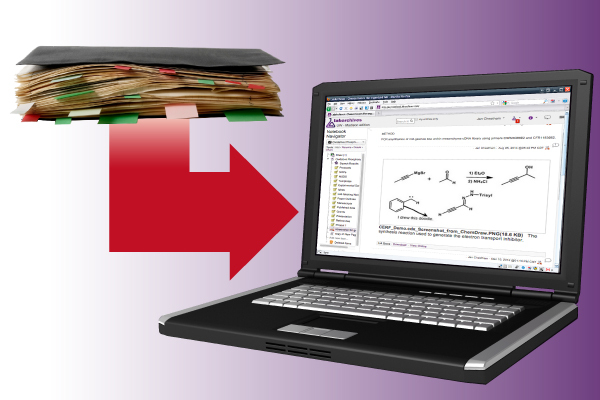Electronic Lab Notebooks now available

An Electronic Lab Notebook serves many of the same functions as a paper lab notebook, but offers additional capabilities such as searchability, integration with digital data sources, and access controls.
Photo illustration: Troy Slama/DoIT
Researchers have long relied on the venerable and trusted paper lab notebook for keeping an orderly record of research data, notes and experimental procedures. Soon, researchers on the UW–Madison campus will have a new option to store and organize these activities in the form of Electronic Lab Notebook (ELN) software services under a new UW contract with LabArchives.
An ELN is a software application that serves many of the same functions as a paper lab notebook, but offers additional capabilities such as searchability, integration with digital data sources, and access controls to facilitate collaboration and protect intellectual property.
Several labs on campus are already using an ELN, having participated in ELN software pilots over the past few years.
Before his lab starting using an ELN, “so much data was being lost,” says Jean-Michel Ané, professor of agronomy. “We were doing a lot of microscopy, taking digital images and printing these images to record in the lab notebook, but we had to remember that the image was on the computer somewhere.”
Mark Meyer, associate scientist in the lab of Wesley Pike in the Department of Biochemistry, started using an ELN because “nearly everything our lab does is digital. Yet we were still writing this all down with pen and paper and missing out on experimental details that researchers just glossed over with so much handwriting. An ELN was a no-brainer.”
While there are many ELN products on the market (including those available through individual accounts), many don’t meet important criteria related to security, usability and a host of data storage requirements that are important to UW researchers, so a campus ELN team has identified a central software solution based on these requirements.
The Benefits of an ELN
Searchability: Researchers consistently emphasize searchability as a primary advantage of ELNs, making them useful for quickly finding records relevant to various aspects of experiments, such as the researcher responsible or the conditions and materials used, as well as readily accessing the raw data, analyses, figures and files relevant for a particular set of experiments.
“No longer do we waste hours finding out what treatment conditions were used for an experiment or where the samples might be logged, or did that compound work in these cells,” says Mark Meyer, who serves as manager for his lab group. “We simply search and see that information in a matter of minutes.”
Security: The UW–Madison LabArchives service is cloud-based. UW–Madison’s contracting process included an extensive review of LabArchives’ data security controls by campus IT Security and Legal Services groups. The agreement with LabArchives includes measures that safeguard the intellectual property and security of UW–Madison research data. Visit the ELN website for more information about security measures and the suitability of the ELN for specific data types.
Access to Data: Researchers can access their notebooks on the ELN platform from various locations and devices and share data and notebooks with collaborators within and outside labs. PIs can readily oversee their lab personnel’s notebooks, which, as Ané notes, encourages lab staff to “do a better job on the lab notebook because they know I look at how they’ve filled out the lab notebook.”
Additionally, using an electronic lab notebook means that researchers can, with the principal investigator’s permission, have access to their information in usable format even after they leave the lab.
Cost: Compared to paper notebooks, using an ELN may save money. For example, the Pike lab noted they are saving on office supplies used to attach digital printouts of data to notebook pages while the Ané lab has realized savings of as much as $1,000 per year compared to purchasing paper notebooks.
Compliance: The ELN can help researchers comply with campus policies, such as the university’s Policy on Data Stewardship, Access, and Retention and the various requirements of research funding entities. The LabArchives platform provides digital timestamps and audit trails of changes, versions, and who accessed records.
Features of the LabArchives Software
- Basic drawing, image annotation, and chemistry tools.
- A cleanly-formatted PDF export that closely resembles a traditional lab notebook.
- Widgets and tools for calculations and creating custom forms.
- Integration with Google docs, GraphPad Prism, PubMed.
- And many more.
Getting Started
LabArchives will be made available to PIs to use in their labs at no cost beginning in September 2014.
PIs interested in enrolling their labs for use of the LabArchives software should visit the ELN website. For more information about an Educational Edition of LabArchives for use in courses, contact Academic Technology at academictech@doit.wisc.edu, 608-262-5667.
—Erik Geiger
